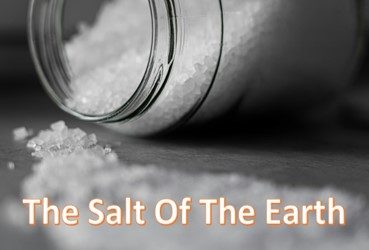
Introduction
THE SALT OF THE EARTH
‘You are the salt of the earth. But if the salt loses its saltiness, how can it be made salty again? It is no longer good for anything, except to be thrown out and trampled underfoot.’ Matthew 5:13
Jesus taught His disciples where true joy is found. The Lord then continued His address to the people, speaking on the subjects of influence and duties.
Jesus metaphorically referred to His followers as ‘the salt of the earth’. What exactly does this mean? To fully comprehend the Messiah’s statement, we must be aware of some qualities that salt possesses.
1. Salt is a flavouring agent.
This is perhaps the most commonly recognised use of salt. Who hasn’t used salt to improve the taste of food that is otherwise bland?
2. Salt is a preserving agent.
Salt that is added to fresh meat will act as a preservative; it will help delay the decay process. The practice of salting meats has been used for years.
3. Salt increases thirst.
Many people like Chinese food, however, after consuming a lot of Chinese food, our bodies will crave fluids for the rest of the evening! The salt contained in Chinese food cheese noticeably increases our thirst.
4. Salt melts ice.
During the winter months, many people use various mixtures of salt to melt ice on roads, driveways, and sidewalks.
5. Salt irritates.
Have you ever been working outside under the hot sun and had sweat running into your eyes? It stings, doesn’t it? The salt contained in sweat is an irritant.
6. Salt has destructive power.
We know that certain portions of our roads, due to concrete damage, have been severely damaged by heavy salting over many winters.
Salt is certainly powerful stuff. Using a little bit will melt the ice, but using a lot can ruin an entire road! Too much salt will also harm or kill living things, such as grass, slugs, etc.
Admittedly, although we understand these attributes and usages of salt today, it is likely that the major thrust of Jesus’ point pertained to salt as a flavouring agent, note His use of the word ‘seasoned’ in the verse, Leviticus 2:13.
Anyone who is striving to follow Jesus will make the world a better place in much the same way that salt helps certain foods taste better. For instance, in Acts 2:47 the disciples were described as ‘praising God and having favour with all the people.’ Without a doubt, they added something good to society.
It is possible for salt to lose its flavour. Normally this should not happen, but it will if the salt becomes contaminated with impurities, e.g., dirt.
Jesus is issuing a warning here. A disciple can lose the qualities that make them valuable before God as ‘salt’ if they aren’t careful to remain separate from harmful impurities like sin, 2 Corinthians 6:17.
If a Christian becomes contaminated with impurity, then they are ‘good for nothing’ in service to the Lord, at least not until they come back to Him and seek forgiveness on God’s terms, 1 John 1:9. A Christian ought to be pure and kind in thoughts, deeds, and speech, Colossians 4:6.
Such a person will have a preserving effect on righteousness and godliness, as salt preserves food and helps prevent spoiling. They will endeavour, like salt, to remove, or melt, any hindrances that could cause others who are searching for Christ to stumble, Matthew 18:6.
However, in the process, they, like salt, may irritate some people. Though this isn’t their purpose, when we live for God and stand up for His cause, some will undoubtedly be rubbed up the wrong way.
It is also true that followers of the Lord, like salt, have the potential to cause destruction if they come in contact with the wrong things, namely, sin.
Christians should endeavour to destroy sin from their lives, Hebrews 12:1-2 / 1 Corinthians 10:13. They should be a force against evil, Ephesians 6:10-18 / James 4:7.
Finally, a faithful disciple should also cause others to thirst for righteousness, Matthew 5:6, as salt itself causes physical thirst.
